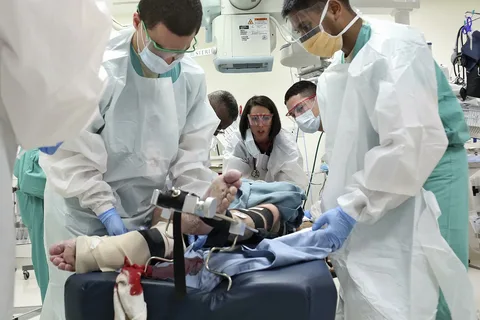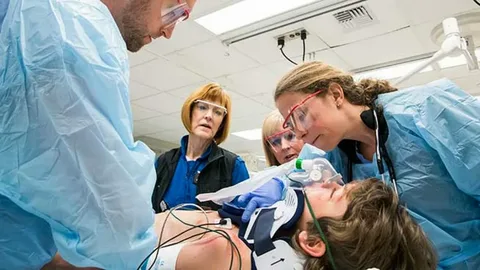Welcome to our blog, where we explore the journey to trauma recovery in Sydney. Trauma is a deeply personal and often misunderstood experience that can leave lasting emotional and psychological wounds. However, with the right support and resources, it is possible to heal and unleash the power within. In this post, we will delve into the various aspects of Trauma Recovery Sydney, from understanding trauma to accessing resources and finding healing. Join us on this journey as we discover the path to reclaiming our inner strength and resilience.
Understanding Trauma: Causes, Effects, and Significance
Trauma is a complex and deeply personal experience that can have profound effects on individuals. It can be caused by a variety of factors, including physical or sexual abuse, witnessing or experiencing violence, natural disasters, or even prolonged periods of stress. The effects of trauma can be far-reaching, impacting every aspect of a person’s life, from their mental and emotional well-being to their relationships and ability to function in daily life.
One significant effect of trauma is the development of post-traumatic stress disorder (PTSD), a mental health condition characterized by symptoms such as flashbacks, nightmares, and severe anxiety. These symptoms can make it difficult for individuals to feel safe and secure in their own lives, leading to a constant state of hyperarousal and a heightened sensitivity to potential threats.
Understanding the significance of trauma is crucial in order to provide effective support and resources for those on their journey to recovery. It is important to recognize that trauma is not a sign of weakness or failure but rather a normal response to overwhelming and distressing experiences. By acknowledging the significance of trauma, we can create a safe and compassionate space for healing to occur.
Embracing Healing: Exploring the Pathway to Trauma Recovery
Embracing healing is a crucial step in the journey to trauma recovery. It involves acknowledging the pain and wounds caused by trauma and actively seeking ways to find healing and reclaim inner strength. While the path to healing may differ for each individual, there are common elements that can guide us on this journey.
One important aspect of embracing healing is creating a safe and supportive environment. It can involve surrounding yourself with understanding and compassionate individuals who can provide the support you need. Building a network of trusted friends, family, or therapists can be invaluable in helping you navigate the ups and downs of the recovery process.
Another key element is self-reflection and self-care. Taking the time to understand your own needs and boundaries is crucial. Engaging in activities that bring you joy, practising self-compassion, and prioritizing self-care can help in the healing process. It can include activities such as meditation, journaling, or engaging in creative outlets that allow for emotional expression.
Additionally, exploring different therapeutic modalities can be an important part of the pathway to trauma recovery. From traditional talk therapy to alternative approaches like art therapy or EMDR, finding the right therapy for you can provide a space to process trauma, develop coping mechanisms, and learn new skills to navigate triggers and flashbacks.
The Role of Therapy and Self-Care in Trauma Recovery Sydney
Trauma recovery is a complex and deeply personal journey that often requires the support of therapy and self-care. These two elements play a vital role in the healing process, providing individuals with the tools and resources needed to navigate the challenges and emotions that arise after experiencing trauma.
Therapy, whether it be individual, group, or specialized modalities, can provide a safe and confidential space for individuals to process their trauma. It allows for the exploration of underlying emotions, thoughts, and beliefs and helps individuals develop coping mechanisms and strategies to navigate triggers and flashbacks. Therapists are trained professionals who can provide guidance, support, and validation, helping individuals feel understood and empowered on their journey to recovery.
Self-care is another essential component of Trauma Recovery Sydney. Engaging in activities that promote self-compassion and self-nurturing can be incredibly healing. It can include practices such as meditation, journaling, physical exercise, or engaging in creative outlets. Self-care helps individuals reconnect with themselves, manage stress, and develop a sense of self-empowerment and resilience.
The Power within Harnessing Inner Strength for Trauma Healing
In the journey of trauma recovery, there is a powerful force within each of us waiting to be unleashed. This force is our inner strength, a wellspring of resilience and courage that can propel us forward on the path to healing. Harnessing this power within is an essential step in the process of trauma healing, allowing us to reclaim control over our lives and rewrite our narratives.
To tap into our inner strength, we must first recognize that it exists. Sometimes, trauma can make us feel powerless and vulnerable as if we have lost a part of ourselves. But deep within, there is a well of untapped potential waiting for us to draw from it. By acknowledging this inner strength, we can start to believe in our ability to overcome adversity and rebuild our lives.
Harnessing our inner strength also involves cultivating self-compassion and self-belief. It means treating ourselves with kindness and understanding, even in the face of setbacks or self-doubt. We must remind ourselves that we are worthy of love and healing and that our past does not define our future. With this mindset, we can begin to embrace our resilience and resilience and embrace our capacity to create a new, brighter chapter in our lives.
Additionally, it is important to surround ourselves with a supportive network of individuals who believe in our journey and uplift us along the way. These could be friends, family, therapists, or support groups who provide encouragement and validation. Their belief in our strength can help to reinforce our own belief in ourselves.
Breaking the Cycle: Overcoming Triggers and Flashbacks
Triggers and flashbacks are common experiences for individuals who have gone through trauma. They can be incredibly overwhelming and disrupt daily life, making it difficult to move forward in the healing process. However, breaking the cycle of triggers and flashbacks is possible and can greatly contribute to trauma recovery.
One important step in overcoming triggers and flashbacks is identifying them. Take the time to recognize the specific situations, places, or stimuli that tend to trigger your traumatic memories or emotional reactions. This awareness can help you anticipate and prepare for these triggers, giving you a sense of control and empowerment.
Once you have identified your triggers, it’s important to develop coping mechanisms to help you manage and navigate through them. It could involve practising grounding techniques, such as deep breathing exercises or focusing on your senses, to bring yourself back to the present moment. Finding healthy outlets for your emotions, such as through journaling or engaging in creative activities, can also be helpful in processing and expressing your feelings.
Working with a therapist who specializes in trauma can provide valuable support in overcoming triggers and flashbacks. They can help you develop personalized strategies and provide tools for managing these challenging experiences. Additionally, therapy can help you address and heal the underlying wounds that contribute to triggers and flashbacks, further reducing their impact on your daily life.
Rediscovering Inner Resources for Trauma Healing
Trauma has a way of stripping us of our sense of self and leaving us feeling disconnected from our inner resources. But even in the midst of the pain and darkness, there is still a glimmer of hope. The journey to trauma recovery in Sydney is not just about healing the wounds but also about rediscovering and tapping into our inner resources.
One important resource that we can rediscover is our resilience. Resilience is the ability to bounce back and adapt in the face of adversity. It is a strength that we all possess, although it may be buried deep within us. Through therapy, self-reflection, and self-care, we can reconnect with this resilience and harness its power to propel us forward.
Another resource that we can rediscover is our intuition. Trauma can disrupt our ability to trust ourselves and make decisions. However, deep down, we still have an inner knowing, a gut feeling that can guide us towards healing. By learning to listen to our intuition and trust ourselves again, we can make choices that align with our true needs and desires.
Additionally, we can rediscover our creativity. Trauma often stifles our ability to express ourselves and shuts down our creative outlets. However, creativity is a powerful tool for healing. Engaging in artistic endeavours, such as painting, writing, or music, can provide a channel for emotional expression and allow us to process and healthily release trauma.
FAQs
Have questions about trauma recovery in Sydney? We’ve got you covered! Here are some frequently asked questions to help guide you on your journey:
1. What is trauma, and how does it affect individuals?
Trauma is a deeply distressing experience that can have profound effects on individuals. Various factors, such as abuse, violence, or natural disasters, can cause it. Trauma can impact a person’s mental and emotional well-being, relationships, and daily life functioning.
2. How can therapy help in Trauma Recovery Sydney?
Therapy provides a safe and confidential space for individuals to process their trauma, explore underlying emotions, and develop coping mechanisms. Therapists offer guidance, support, and validation, helping individuals feel understood and empowered.
3. What role does self-care play in trauma recovery?
Self-care is crucial in trauma recovery. Engaging in activities that promote self-compassion and self-nurturing can be incredibly healing. It can include practices like meditation, journaling, exercise, or engaging in creative outlets.
4. How can I overcome triggers and flashbacks?
Identifying triggers and developing coping mechanisms can help manage and navigate through triggers and flashbacks. Grounding techniques and finding healthy outlets for emotions, such as journaling, can be helpful in processing and expressing feelings.
5. What inner resources can I tap into for trauma healing?
Rediscovering your resilience, intuition, and creativity are important inner resources for trauma healing. Through therapy, self-reflection, and self-care, you can reconnect with these resources and use them to propel yourself forward.
Conclusion
In this blog post, we have explored the journey to trauma recovery in Sydney. We have delved into the causes, effects, and significance of trauma and discussed the importance of embracing healing, therapy, and self-care in the recovery process. We have also explored how to harness inner strength, overcome triggers and flashbacks, and rediscover inner resources for healing. Remember, trauma recovery is a personal and non-linear process, but with the right support and resources, healing is possible. You have the power within you to reclaim your life and find strength and empowerment on this journey to recovery.



